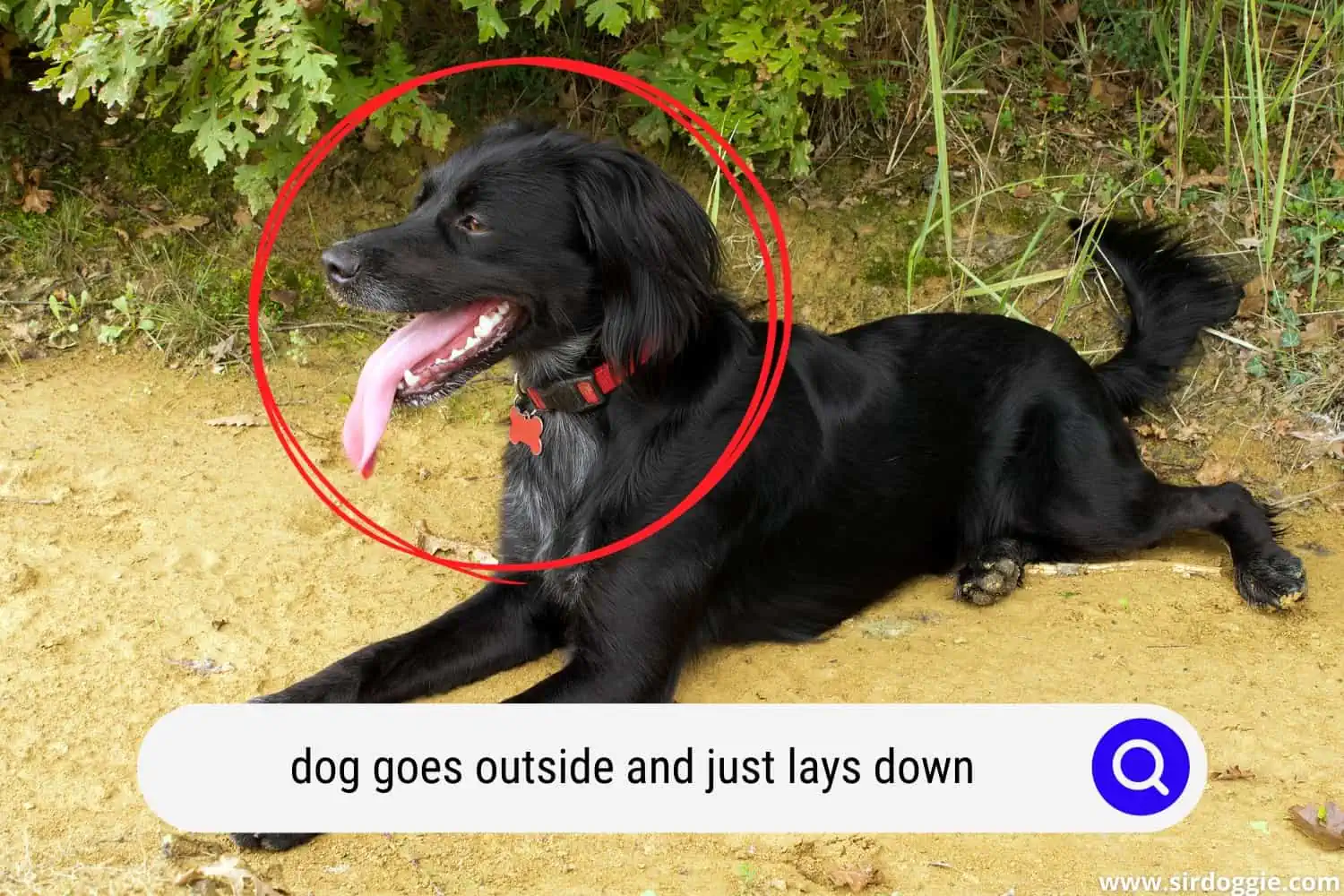Why Does My Dog Go Outside and Just Lie Down?
It’s unusual to see dogs spend time away from their families because they’re such social creatures. It happens though, and owners get confused when their dogs become isolated and spend less time communicating and playing with them. Why do dogs sometimes go outside and just lie down by themselves?

When a dog goes outside and simply lies down rather than playing or using the bathroom, this can be due to depression, boredom, or just lethargy from old age. When dogs feel depressed, they show symptoms that are extremely similar to those exhibited in humans, such as the desire to lie down alone and sometimes even loss of appetite.
When your dog doesn’t have anything else fun or interesting to do, they may also go lie down and just rest until a family member is home or something catches their attention—this is especially true in older dogs who use their limited energy sparingly throughout the day.
Dogs need your continuous and loving attention to maintain their physical health and mental well-being. When your dog seems bored or depressed, giving them extra love and attention is the best way to help remedy the situation and get them back to their usual selves.
Why Do Dogs Lie Down?
If you’ve noticed that your dog spends a lot of time alone and avoids sitting with you, pay attention to his or her behavior and any noticeable changes in habits. Any changes in diet and behavior, along with their age and medical history, will provide crucial information about why your dog is lying down alone and prefers isolation.
Behavioral abnormalities, such as depression or lethargy, may be behind this isolation as well. The following issues can either be or indicate an underlying problem that’s causing your dog to desire to spend more time outside alone:
- A lack of attention
- Depression
- Aging
- Sickness
- Anxiety
- Boredom
- Pain
Why Does a Dog Get Depressed?
Depression and other isolating conditions can affect dogs just the same as how they affect humans. Decreased mobility, a change in family dynamics or members, or the loss of a loved one are all examples of major life changes that can lead to depression.
Aging and its physical effects can take a toll on a dog’s mental health as it becomes less active and doesn’t feel quite as youthful and healthy as before. Changes in a dog’s family may also cause them to have trouble adjusting, whether this is due to the loss of a family member, the addition of a new family member or pet, or even being rehomed and losing its entire known family despite gaining a new one. When a dog deals with loss, they often experience changes in their hunger and activity levels that strongly indicate the symptoms of depression, and they may even hunt for their missing mate.
Reduced social connections and interactions, anxiety, and sleep disturbances are common signs of depression, and your dog may display some of these behaviors if he or she is having trouble coping with a situation. Additionally, a chemical imbalance in the brain could be another possible cause of depression in your dog. This potential cause should be addressed with the help of a veterinarian and behavioral specialist since it’s a bit more difficult to resolve.
Age of Your Dog
Dogs sometimes have a difficult time handling what used to be their everyday lives when they get older. Humans can complain about their difficulties, but dogs can’t understand nor express why they’re having trouble seeing, hearing, or understanding what’s going on around them. Because of their physical and mental decline over the years, their mobility may become limited as they experience conditions such as cognitive impairment, confusion, and a lack of concentration.
As a dog gets older, its physique changes as well as its sleeping and eating patterns change. During this transition into a lower quality of life and old age, your dog needs to consistently receive proper care and attention—otherwise, you may notice that he or she will seemingly become depressed.

Your Dog May Be Sick
Depression, inactivity, and isolation can be caused by a variety of illnesses and diseases. Your dog may be unable to play or move as freely as it typically would due to physical discomfort. When a dog is sick, he may be calmer than usual, lose his appetite, and often lie down.
Whenever you observe such symptoms in your dog, you should consult a veterinarian as soon as possible.
Your Dog May Suffer with Anxiety
Anxiety and fear are widespread issues found in dogs, and they can be induced by a variety of factors, including poor socialization or trauma. Dogs can display trembling behaviors, “screaming,” and over-barking—in addition to lying down—when scared. Distressing levels of noise or startling noises can cause your dog to avoid noisy environments, even if it means avoiding family members.
This can often be seen in dogs who are scared of the fireworks used during holiday celebrations throughout the year, dogs who become extremely distressed in loud and hectic environments (when they’re not used to them), and those that may have experienced trauma due to verbal abuse and cannot handle exposure to loud or harsh-sounding voices. After becoming scared, many dogs will try to remove themselves from the upsetting situation and go lie down out of fear and distress.
Your Dog May Want a Change of Environment
If there is noise in your home and you have visitors, your dog may choose to go outside simply to find some peace. Dogs often want to be in calm houses or surrounded by other dogs and people playing with them. When they don’t find any attention or response due to a disrupted environment, they will often go outside and be more likely to return once the environment returns to normal.
Your Dog May Be in Pain
For some dogs, pain may be the major problem contributing to their change in behavior and habits. Joint, bone, and muscle problems—as well as numerous types of traumas and accidents a dog may experience—can create pain that makes it difficult to move.
Arthritis and muscle weakening in older dogs can lead to a reduction in mobility, limping, the inability to jump, and even discomfort and difficulty sitting. Because of the pain, dogs may be unable to follow their family members around the house as easily as before, preferring instead to lie down quietly or avoid situations that may aggravate their health issues.

Related Questions
Why does my dog lie on my feet?
Dogs consider their human partners to be family members—just like how we feel about them—which is why your adorable puppy always claims and defends you. When your dog is at your feet, this is his way of claiming you as his property. It’s a way for him to show his love and affection for you.
How do I stop my dog from hiding under things?
Training your dog to do different things and overall engaging in activities to stimulate his or her mind is one potential method to keep him from spending so much time hiding underneath such things as your bed or table. Reward your dog with his favorite treat when you see good behavior and he comes out to play and be social. Make your dog’s environment as calm and as welcoming as possible and be sure to praise and reward him (with a treat!) each time he engages in good social behaviors, this should help him avoid hiding in everyday situations and learn that being out and about it a great thing.
What are the symptoms of depression in dogs?
Depression symptoms in dogs are nearly exactly like those seen in humans. Low levels of activity, a loss of interest in previously loved activities, and changes in eating and sleeping habits are the main defining features. Aggressive behavior, such as unusual or excessive barking shouting, and snapping, may be displayed by some dogs as well.

Family Dog Expert Author
Hi there! I’m Stuart, a devoted dog lover and family dog expert with over a decade of experience working with our furry companions. My passion for dogs drives me to share my knowledge and expertise, helping families build strong, loving bonds with their four-legged friends. When I’m not writing for SirDoggie, you’ll find me hiking, playing with my beautiful dog, or studying music.